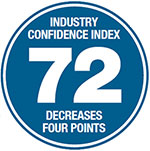The construction market remains strong, but construction firms that were excited about the pro-business agenda of President Trump immediately after his election in November are now moderating their long-term outlook.
 大多数高管认为,市场将继续增长一年,但许多人认为,除非特朗普政府在其促成增长计划上表现出更多进展,否则繁荣将在2019年开始升级。
大多数高管认为,市场将继续增长一年,但许多人认为,除非特朗普政府在其促成增长计划上表现出更多进展,否则繁荣将在2019年开始升级。
The new caution can be seen in the results of the ENR Construction Industry Confidence Index survey. The CICI fell in the second quarter after rising sharply for two straight quarters. Of the 232 executives of large construction and design firms responding to the survey, most believe market growth will continue at least through the middle of 2018. But beyond that, the execs are less optimistic. The CICI index fell four points to 72 on a scale of 100 from the first quarter of 2017.
The CICI measures executive sentiment about the current market and reflects the respondents’ views on where it will be in the next three to six months and over a 12- to 18-month period. The index is based on responses to surveys sent out from May 26 through June 26 to more than 6,000 U.S. firms on ENR’s lists of leading general contractors, subcontractors and design firms.
View the full ENR 2017 2Q Cost Report PDF
CFMA Survey Sees Cause for Concern
新泽西州普林斯顿建筑金融管理协会最新的Confindex调查的即将发布的结果类似地表明,高管们对2018年及以后将带来的建筑市场的越来越警惕。
CFMA each quarter polls 200 CFOs from general and civil contractors and subs. The CFMA Confindex is based on four separate financial and market components, each rated on a scale of one to 200. A rating of 100 indicates a stable market; higher ratings show market growth or conditions that should foster growth.
“The overall Confindex fell from 130 in the first quarter to 123 in the current quarter,” says Stuart Binstock, CEO of CFMA. Two of the four components of the Confindex also fell dramatically in the first quarter, he notes.
The “general business conditions” component plunged 12 points, to 124, and the “year-ahead outlook” also fell 12 points, to 119, Binstock says. The Confindex “financial conditions” component fell a more modest two points, to 123, and the “current market conditions” component declined three points, to 126, Binstock notes.
Much of this decline in confidence comes from the growing realization that much of the Trump agenda is at risk from Congress. “Much of the bounce in the Confindex was from the industry’s reaction to November’s election: that Trump’s agenda could help the industry,” says Anirban Basu, CEO of economic consultant Sage Policy Group Inc., Baltimore.
巴苏说:“议程的真正明星是1亿美元的基础设施刺激提案。”但是在上任五个月后,特朗普没有比一月份更接近履行基础设施的诺言了。他补充说:“行业中的许多人认为,直到2018年才有基础设施包。”
Another concern among the CFOs answering the CFMA survey is what financial conditions will be like in 2018. “In our fourth quarter survey, 46% of CFOs believed profits would rise next year,” says Binstock.
他进一步指出,在第一季度,有40%的人认为利润将在未来的一年中增加,但是在本季度,只有30%的利润认为利润将在明年上涨。
“One of the major problems is staff shortages are putting pressure on wages. Wage increases go directly to the bottom line,” Binstock says, adding that CFMA members hoped that a rising market would raise revenue and increase margins, offsetting added labor costs. “Now, our members are not so sure.”
Going-Out-of-Business Sales
当将CICI公式应用于个别市场领域时,与上季度的评级相比,第二季度测量的15个市场中的十个市场的信心实际上增加了。
However, execs anticipate the rate of growth will slow over the next 18 months in all nine general building sectors measured by ENR, compared to the current market. On the other hand, executives believed that five of the six non-building sectors would grow more quickly over the next 18 months. Only hazardous waste sagged.
一个主要的经济趋势是对Enr CICI调查产生影响。新利luck公众偏爱在线购买的趋势的增长是对零售市场产生严重影响。现在,零售业是调查衡量的所有15个领域中最低的评级,CICI评级为43。在过去的六个月中,该评级下降了13分。
The trend toward online buying has resulted in the lack of demand for new or refurbished stores. Basu says, “There are studies that estimate that there will be as many as 8,600 store closings this year. That is more than in 2008, when we had the financial meltdown.”
Overall, construction executives believe that the market will continue to grow through the end of 2018, but wonder whether the market’s day of reckoning will come in 2019. “Six months ago,
people were not worried about the future. Now they are,” Basu says.


